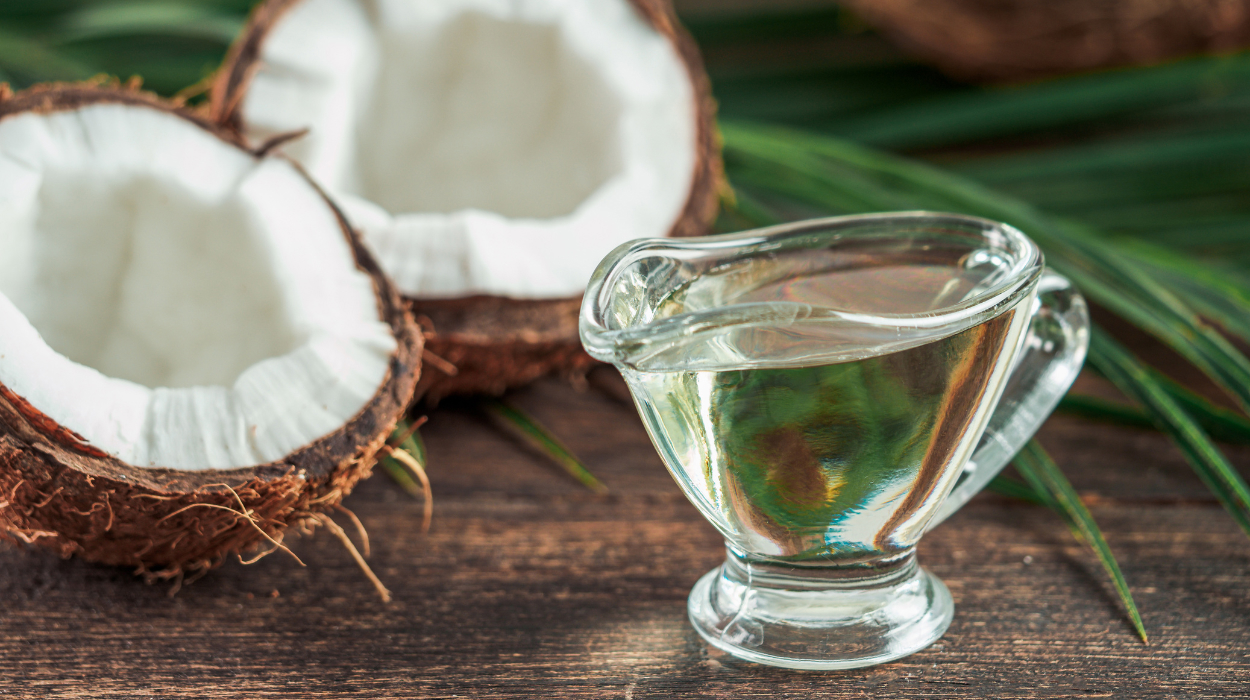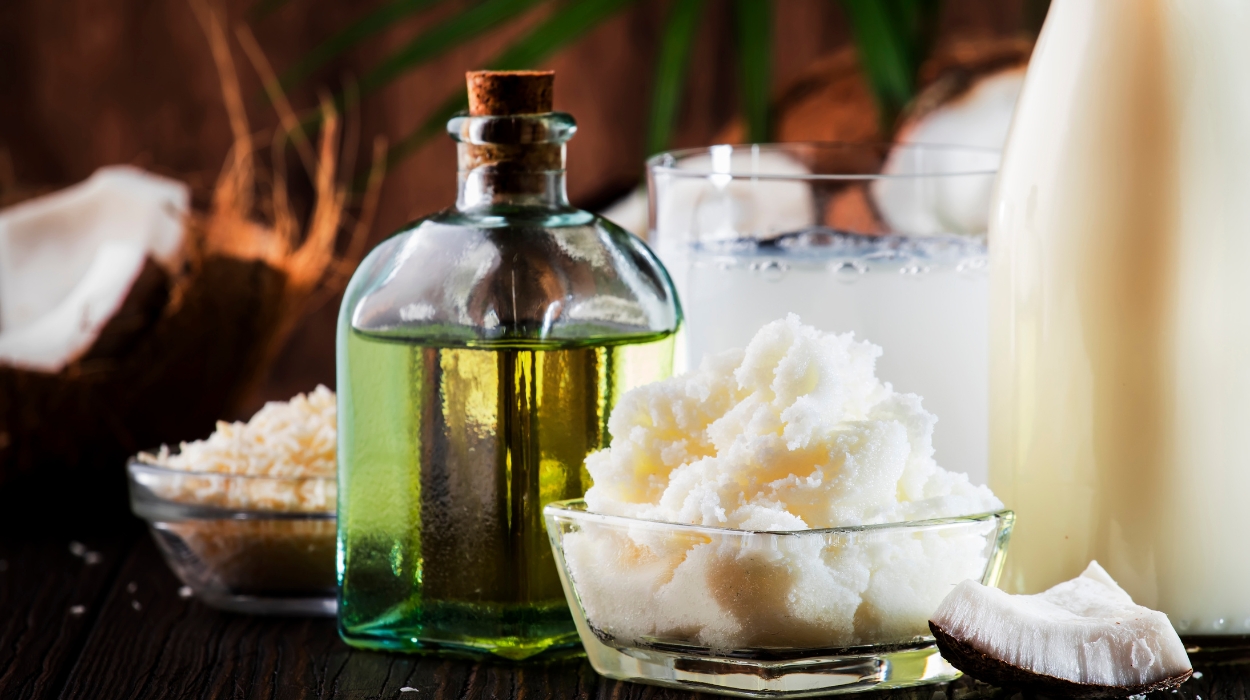Medium-chain triglycerides, or MCT oil, are a type of fat source that we can get from coconut or palm oil. Nowadays, you may encounter MCT oil more as it has gained popularity with its health benefits and effects on weight management.
Some may even add MCT oil to coffee, but do you know how to use MCT oil for weight loss?
Here, we’ll explore the benefits of MCT oil in aiding weight loss. We’ll start with understanding its composition, benefits, and impact on metabolism. To help you decipher the best practices for consumption, we’ll also unravel the nuances of adding MCT oil into your daily routine.
How To Take MCT Oil For Weight Loss
Start with low doses to maximize MCT weight loss benefits. Integrate it into meals or coffee for sustained energy and appetite control. Begin with a small amount and gradually increase, listening to your body’s response.
Consider factors like dosage, timing, and personal tolerance. Always consume MCT oil as part of a balanced diet and consult professionals for personalized guidance.
How To Use MCT Oil For Weight Loss

MCT oil is sourced from coconut or palm kernel oil.
According to the USDA,[1] the nutritional value of 100 ml of coconut MCT oil is
- Energy: 800 calories.
- Total fat: 93.3 grams.
- Fatty acids: 86.7 grams.
The fatty acids in MCT oil are a unique type called medium-chain triglycerides. These contain chain lengths of 6 to 12 carbon atoms. The other fatty acids with 14 to 18 carbon atoms are long-chain triglycerides or LCT.
The difference in size makes MCT easier to digest and assimilate.
Once you ingest MCT fatty acids, the fatty acid molecules go directly to the liver, quickly converting into energy, unlike LCTs. The body stores LCT as fat cells.
MCT coconut oil benefits encompass weight management,[2] satiety,[3] and improved[4] brain function.
Now that you know MCT is good for weight loss, below is how to take MCT oil for weight loss.
- Add it to coffee or tea.
- Blend it into smoothies or protein shakes.
- Add it to soups or sauces.
- Use it for low-temperature cooking. MCT oil has a low smoke point at 320°F, making it suitable for low-heat cooking. It’s ideal for sautéing or stir-frying. Above 320°F, MCT produces an unpleasant smoky odor and flavor.
How MCT Oil Helps With Weight Loss

Here is how MCT achieves weight management:
MCT Promotes Appetite Control
MCT oil reduces energy intake because it promotes delayed gastric emptying.[5] This way, you feel full longer, decreasing your overall calorie intake. MCT also triggers leptin hormone[6] release better than LCT, promoting satiety.
MCT Oil Promotes Thermogenesis
Thermogenesis is the process of your body producing heat to keep you warm. This process speeds up calorie burning, potentially helping you shed pounds. In healthy human beings, MCT, used alongside chili peppers, boosts diet-induced thermogenesis[7] by over 50%.
MCT Oil Accelerates Fat Metabolism
Medium-chained fatty acids break down faster to generate energy. Besides, MCT oil may reduce bad cholesterol levels,[8] or low-density lipoproteins, and increase high-density lipoproteins, which are good cholesterol, thus contributing to cardiovascular health.
MCT Oil Boosts Exercise Performance
MCT supports weight loss because it promotes mitochondrial biogenesis and metabolism[7] in the skeletal muscle. Mitochondrial biogenesis is your cell’s power source multiplying to boost energy production.
MCT Oil Enhances Ketosis
MCT oil bypasses the digestion mechanisms and heads straight to the liver through the digestive system. Here, the liver converts them to ketone bodies.[9] Ketones are fuel molecules made from fat, powering you up when glucose runs scarce. They support weight loss by significantly reducing fat mass.
MCT Favors Glycemic Control
Consuming MCT before meals may lower blood sugar levels and increase insulin secretion.[10]
However, in a case report on a diabetic patient, coconut oil supplementation[11] resulted in hypoglycemia, reducing the patient’s insulin requirements. Hypoglycemia is low blood glucose levels that are below normal, and unfortunately, it may lead to dangerous physiologic conditions.
If you have health problems related to blood sugar and insulin management, you should talk to your doctor first before using MCT oil for blood sugar or insulin-lowering effects.
How Much MCT Oil Per Day To Lose Weight?
MCT oil is great for weight loss, but the quantity matters because of its high caloric count. A calorie deficit eases the burning of more calories than you consume. This makes your body tap into fat stores for fuel. You need to consume fewer calories to achieve a caloric deficit of about 500 to 750 calories[12] daily to lose weight.
So, if you are watching how many calories to lose weight, below are some suggestions. These suggest the ideal daily intake of MCT oil based on its purpose.
For Weight Loss
A 2023 article on MCT oil supplementation suggests 20 grams daily[13] on a very low-calorie ketogenic diet. This MCT dosage may reduce body weight, BMI, and waist circumference. There was also a reduced fat mass and inflammation and increased muscle mass.
For Fat Oxidation During Exercise
A 2022 article assessed a daily 2-gram[14] intake of MCTs over two weeks by subjects who weren’t used to physical activity. Its ingestion increases fat oxidation during exercise. And so, a 2-gram daily dosage may increase fat burning during exercise in people with BMIs ranging from 25 to less than 30.
For Favoring Ketogenesis
A 2021 assessment offered the following four recommendations to turn on the ketogenic effect of MCTs:[15]
- A starting dose of 5 grams of caprylic acid or 5 g of a combination of caprylic and capric acid. Both acids are components of MCT. This dosage progressively increased to 15 -20 grams of caprylic acid.
- Consuming MCT after an overnight fast, with no meal, or accompanied by a low-carbohydrate meal.
- Mixing it with caffeine.
- Emulsifying the MCTs. You can emulsify MCT oil by blending it with a high-powered blender, whisking it with egg yolk, or using an emulsifying agent like lecithin.
For Brain Health
A 2022 article on MCT’s benefits to Alzheimer’s disease lists a 42-gram daily or maximum tolerated[16] dosage. Of the twenty subjects examined, eighty percent reported cognitive improvement. The results were better with a 9‐month continual use.
From the above studies, MCT dosage is dependent on the purpose. So much so that getting to that dosage might require medical intervention. Still, here is a questionnaire you may use to determine how much MCT oil per day to lose weight:
- What are your goals?
Different goals may require different dosages.
- What is your current diet and exercise routine?
Since MCTs are high-caloric fat, consider tracking your overall fat intake.
If you are active, you may land on higher dosages.
- What is your MCT tolerance?
Starting high may cause digestive issues, headaches, and skin breakouts.
Consult a medical professional for a full medical assessment. The assessments will help them finalize the dosage that may meet your goals.
Best Time To Take MCT Oil For Weight Loss
Did you know consuming MCT on the wrong schedule can affect your weight loss efforts?
Here is how:
- Consuming MCTs near bedtime or without mindful portioning may lead to a caloric surplus. If you are inactive, you may gain weight without considering how many calories you burn while you sleep.
- Consuming MCT close to bedtime may also stimulate digestion and energy production. This might trigger insomnia and ruin your sleeping patterns. With sleep deprivation, you may experience an increased energy intake.[17] You may crave foods high in fat and carbohydrates.
Best Timing For Taking MCT
Here are some timelines to consume MCT:
- Morning: Mixing MCT with coffee or any other hot beverage kickstarts satiety and metabolism.
- Pre-Meal Boost: You can consume MCT oil 20 minutes before meals to curb hunger, reduce calorie intake, and enhance weight loss.
- Pre-Workout Fuel: You can consume MCT oil before exercising to elevate energy levels and support fat burning during physical activity.
- Distributed Dosage: Divide your daily MCT oil intake across meals to maintain a consistent metabolic boost throughout the day. Avoid consuming very close to bedtime.
Landing At The Best Timing
Here are some pointers to help you land at the best MCT consumption timing.
- Listen to Your Body: Be keen and pay attention to how your body responds to MCT oil at different times.
- Consider Your Schedule: Align MCT oil intake with your daily routine. If you are an early riser, start early. This ensures it complements your lifestyle.
- Consultation: Seek professional advice to tailor MCT oil consumption to your needs and health conditions.
Incorporating MCT oil at optimal times helps you harness its potential to amplify weight loss.
Coffee And MCT Oil
Coffee and MCT oil have conjured a very interesting relationship. Coffee, as a beverage, aids weight, body mass index, and body fat reduction.[18] MCT oil helps reduce fat mass and adipose tissue[19] compared to vegetable oils like olive oil. So, it’s natural that a blend of the two works wonders for weight loss.
When you limit your overall carbohydrate intake while using MCT oil in coffee, it might trigger ketogenesis.[20]
How To Select The Best MCT Oil For Weight Loss
So many MCT oil brands are available; here is how to select the best high-quality MCT oils. Chose based on:
- Concentration: Opt for at least 50% MCTs, including caprylic acid, i.e., C8, and capric acid, i.e., C10, for optimal benefits.
- Types of MCTs: Select based on preferences—C8 for highest ketogenic effects,[21] C10 for sustained energy,[22] or a blend for both.
- Purity and Sustainability: Prioritize organic, cold-pressed, virgin coconut oil options from sustainable sources to avoid additives.
- Personal Preferences: Consider taste, texture, and price. Experiment with various brands to find the one that suits you.
Potential Side Effects Of MCT Oil
While MCT oil is good for weight loss, here are some possible side effects to be aware of:
Digestive Discomfort
- Diarrhea: Consuming large amounts of MCT may cause loose stools.
- Nausea: Digestive overload can lead to mild stomach upset.
- Bloating and gas: Increased gas may signal sensitivity to MCTs.
Other Potential Side Effects
- Headaches: Initial intake may trigger headaches in some people.
- Fatigue: Digestive stress can result in unusual tiredness.
- Skin breakouts: Rarely, acne or irritation may occur due to sensitivities.
- Negative medication and supplement interactions: Taking MCT with high doses of caffeine might cause jitters and insomnia.
Tips For Minimizing Side Effects
If you want to reduce side effects, follow the following guidelines.
- Start slow: Introduce small amounts and monitor your body’s response.
- Consume with food: Pairing with meals aids digestion and reduces discomfort. But track your overall calorie intake.
- Exercise caution when using MCT with supplements: If you regularly use diet pills or fat burners prescribed by your doctor, ensure the ingredients do not clash with MCT oil and consult your doctor first.
- Listen to your body: Adjust or cease intake if symptoms arise.
- Seek professional guidance: Consult a healthcare professional for personalized advice if concerns persist.
Conclusion
MCT oil promotes weight loss through appetite suppression, thermogenesis, and fat metabolism. MCT oil’s other health benefits are promoting ketosis and boosting exercise endurance.
Yet, it is a high-fat oil, meaning portion control is paramount.
All in all, the pros of MCT oil for weight loss outweigh the cons. So, you can add MCT oil to a balanced ketogenic diet to lower body weight.
To avoid the cons, such as digestive discomfort, ensure proper dosage. Medical professional guidance is the ultimate protection against side effects.
As with any supplement, moderation, and awareness of losing weight contribute to unlocking the full benefits of MCT oil. Follow these rules, and you may finally get to a healthier, leaner body.
Frequently Asked Questions
MCT oil benefits weight loss, promoting fat burning and boosting metabolism.
Taking MCT oil on an empty stomach may enhance its fat-burning effects and provide quick energy.
Taking MCT oil daily is generally safe, but start with a small amount.
MCT oil can support fat burning during sleep by providing a sustained energy source.
Excessive intake may lead to digestive issues; start with small amounts to avoid adverse effects.
 Evidence Based
Evidence Based
